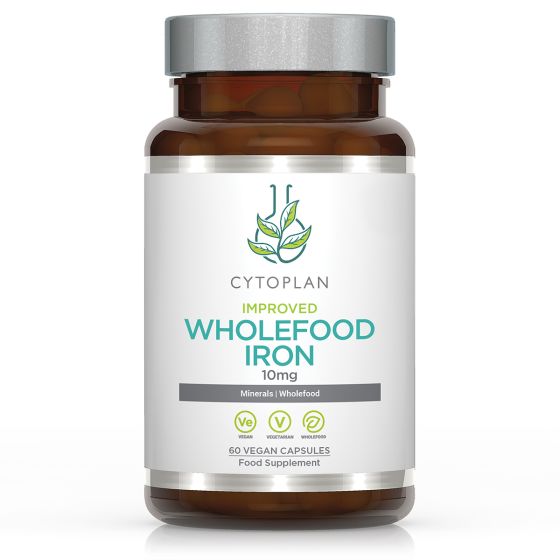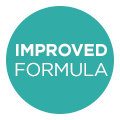- High potency iron supplement – 10mg
- Highly absorbed iron bisglycinate
- Gentle on the stomach
- Non-constipating
- Especially useful for people prone to low iron levels – vegetarians, vegans, and women under 50
- An ideal choice for those who do not tolerate prescription iron or other iron supplements
- Iron is vital for red blood cell formation, helping to carry oxygen to cells
- Iron helps increase energy metabolism and reduces tiredness
- Iron complexed with wholefood kale
- Easy to swallow, small capsules
- Suitable for vegetarians and vegans
Wholefood iron is a high potency supplement to gently and effectively improve blood iron levels. Wholefood iron contains 10mg of iron per capsule in the form of bio-effective ferrous bisglycinate, which is gentle on the stomach, but very well-absorbed and used by the body. It’s a non-constipating ideal choice for those who do not tolerate prescription iron or other supplement forms very well.
What does iron do in the body?
Iron is a vital mineral, essential for forming haemoglobin in red blood cells, which carry oxygen from the lungs to the cells to make energy. Without enough iron, oxygen levels are reduced, potentially resulting in tiredness and fatigue, affecting cognitive function (memory, thinking skills) or development in children, and immune function.
Who is more at risk of low iron or iron deficiency?
Iron levels may be reduced in menstruating women especially if periods are heavy, or if dietary levels are low. Pregnancy requirements for iron are greatly increased, resulting in a higher risk of deficiency. Most dietary iron is found in red meat, and other animal products such as dairy, so vegetarians, and especially vegans, may struggle to maintain iron levels. Although iron is high in some vegetables like spinach, it tends to be highly complexed in fibre and can be very poorly absorbed.
How do I know if I’m low in iron?
Low iron than optimal levels of iron can be fairly common in women of menstruating age, vegetarians, vegans, teenage girls and in pregnancy. Symptoms include pale skin, pale inner eyelids, shortness of breath, palpitations, pounding in the ears, headache, and, of course, general weakness, tiredness and fatigue. In severe cases red blood cell numbers may reduce so much that iron deficiency anaemia may result, and can be diagnosed via a blood test from a GP.
What’s the best iron supplement to help?
Iron supplements are not all the same. The form the iron is in makes a big difference to how well tolerated it is and how well it is absorbed and used by the body. In particular, prescribed iron from the GP as ferrous fumarate or sulphate is very strong and can irritate the digestive system, causing pain, nausea, diarrhoea or constipation. People who react to this may be better off taking a gentler, better absorbed form of iron over a longer period of time. Iron bisglycinate is a gentle, bio-effective form of iron (well absorbed and used by the body) and can help to increase iron levels effectively without the risk of digestive upset.
| Active Nutrient | Strength | %NRV* |
| Iron | 10mg | 71 |
|
+NRV = Nutritional Reference Value * Indicates no NRV |
||
Kale powder (Brassica oleracea), iron (as ferrous bisglycinate), plant cellulose (capsule shell).
1 - 2 capsules daily or as directed by your practitioner.
Vegetarians and vegans and for people with Candida and yeast sensitivities.
It is not recommended that men and post-menopausal women supplement with iron unless recommended to do so by a doctor or practitioner. Iron, if taken in excess, may be harmful to very young children.
Plant cellulose (capsule shell).
GMO, wheat, soy, dairy, added sugar, flavourings & colourings.
Keep cool, dry & out of direct sunlight.






